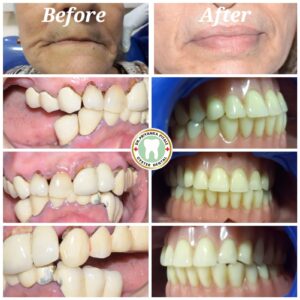
Full Mouth Rehabilitation and Geriatric Dentistry
Due to ageing / special conditions / syndromes / accidents, some of the members of our society lose teeth. At times, way too before ageing. Full mouth rehabilitation and geriatric dentistry are two essential aspects of modern dental care, aimed at restoring oral health, functionality, and aesthetics, particularly for older adults who often face unique dental challenges.
The compromised bite, missing multiple teeth, weak supporting structures, deficient bone, TMJ anomalies, musculoskeletal issues, and underlying medical conditions demand keen assessment and a holistic approach eventually leading to complex treatment planning, where function of chewing, speech, and aesthetics is rebuilt. The focus is to achieve stable results.
Mobility and dexterity of senior citizens is given special attention while planning the treatment for them.
Full Mouth Rehabilitation
Full mouth rehabilitation, also known as full mouth reconstruction, involves a comprehensive and individualized treatment plan to restore the health, function, and appearance of the entire mouth. This extensive procedure is often necessary for patients with multiple dental issues, such as severe tooth decay, advanced periodontal disease, tooth loss, tooth replacement, or damage resulting from trauma or prolonged neglect.
The process begins with a thorough evaluation by the dentist, including a detailed examination of the teeth, gums, bite, and jaw joints. Diagnostic tools such as X-rays, photographs, and dental impressions are used to assess the extent of the dental problems. Based on this evaluation, a customized treatment plan is developed, which may include a combination of procedures such as:
- Dental Crowns and Bridges: To restore damaged or missing teeth and improve bite function.
- Dental Implants: To replace missing teeth with durable and natural-looking artificial teeth anchored in the jawbone.
- Periodontal Treatment: To address gum disease and ensure the foundation for the teeth is healthy.
- Orthodontic Treatment: To correct misalignment and improve the overall function and appearance of the teeth.
- Veneers and Bonding: To enhance the aesthetics of the teeth by correcting issues such as discoloration, chips, and gaps.
- Occlusal Adjustments: To correct bite issues and alleviate jaw pain.
Full-mouth rehabilitation not only improves the oral health and functionality of the mouth but also enhances the patient’s overall quality of life by boosting confidence and allowing them to enjoy a wider range of foods and social interactions.
 Geriatric Dentistry
Geriatric Dentistry
Geriatric dentistry focuses on addressing the unique dental needs of older adults. As people age, they may face a variety of oral health challenges due to factors such as medication use, systemic health conditions, reduced dexterity, and natural wear and tear of the teeth and gums.
Common issues in geriatric dentistry include:
- Dry Mouth (Xerostomia): Often a side effect of medications, dry mouth can increase the risk of tooth decay and gum disease. Dentists can recommend treatments and products to alleviate dry mouth symptoms and protect oral health.
- Tooth Decay and Gum Disease: Older adults are more susceptible to cavities and periodontal disease. Regular check-ups, professional cleanings, and proper oral hygiene practices are essential to prevent and manage these conditions.
- Tooth Loss and Replacement: Dentures, dental implants, and bridges are common solutions to replace missing teeth, restore function, and improve aesthetics.
- Denture Care: For those who wear dentures, proper care and regular adjustments are necessary to ensure comfort and functionality.
- Oral Cancer Screening: Regular screenings are crucial for early detection and treatment of oral cancer, which has a higher incidence in older adults.
Geriatric dentistry aims to provide comprehensive and compassionate care tailored to the needs of elderly patients, helping them maintain their oral health and quality of life as they age.
In conclusion, both full-mouth rehabilitation and geriatric dentistry are critical in addressing complex dental needs and ensuring optimal oral health. Through personalized care and advanced dental treatments, these practices enhance the functionality, aesthetics, and overall well-being of patients, particularly those in the later stages of life.